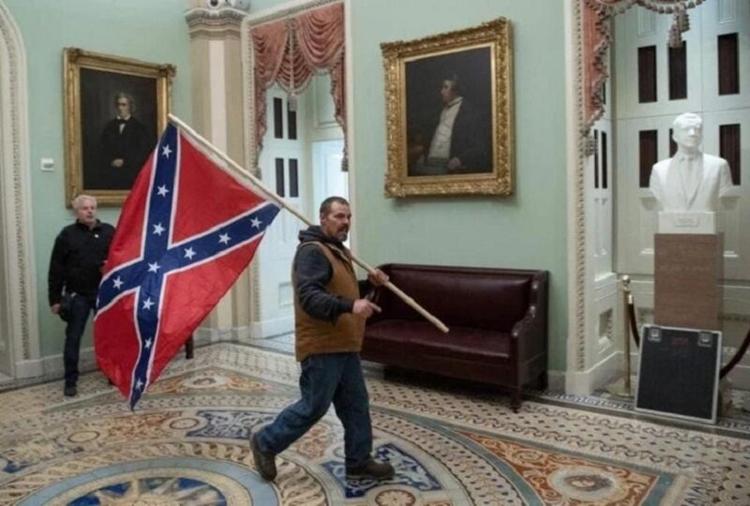Rutgers-Eagleton Poll: 6 in 10 New Jerseyans Think Political Violence in U.S. a Major Problem

New Jersey voters are apprehensive about what Election Day may bring, in terms of subsequent political violence and the future of the country’s democracy, according to a special Rutgers-Eagleton Poll in partnership with NJ Advanced Media and the Miller Center on Policing and Community Resilience at the Eagleton Institute of Politics.
Democrats, Republicans, and independents alike share this trepidation.
Forty-seven percent are “very worried” and 39% are “somewhat worried” about the future of America’s democracy. Partisans on either side of the aisle share this worry, though to varying degrees – 92% among Democrats, 84% among independents, and 79% among Republicans when it comes to being “very” or “somewhat worried.”
Worry may stem, at least in part, from beliefs that the tone and nature of politics has become less respectful (86%) and that political violence is a major (59%) or at least minor (28%) problem in the United States right now. About 8 in 10 say it is either “very” (37%) or “somewhat likely” (42%) that there will be some sort of political violence in response to election results in the U.S. in the coming months. Once again, partisans agree on these issues, just at different levels: Republicans and independents are less likely than Democrats to say political violence is a major problem – though still half or more of each group feels this way – and smaller majorities among these two groups believe post-election violence is likely.
“Concerns over democracy’s future and the threat of political violence are not one-sided,” said Ashley Koning, an assistant research professor and director of the Eagleton Center for Public Interest Polling (ECPIP) at Rutgers University-New Brunswick. “Democrats, Republicans and independents alike are all worried about the same issue here, but likely foresee different solutions and likely blame the other side as the culprit. Living through a time marked by the constant threat and reality of political violence – including the Capitol riot, contentious protests, and assassination attempts within the past few years alone, it is hard for voters to see much hope for America’s future, especially in the coming weeks.”
Fourteen percent of voters say there may be times where it is justified to break the law to defend one’s own political beliefs, advance a political objective or express political dissatisfaction; 71% don’t think it is ever justified and 15% are unsure. Independents are more likely to say this behavior can be justified than partisans on either side of the aisle.
Overwhelming majorities say it is “never” justified to take actions such as physical harm (90%), property damage (87%) or intimidation (84%) to defend one’s own political beliefs, advance a political objective or express political dissatisfaction; voters largely view the action of protests or rallies as “always” (47%) or “sometimes” (33%) justified, however.
Nearly all voters say they would be “not very likely” (7%) or “not at all likely” (90%) to ever consider engaging in political violence, yet 11% say they know someone who would. Democrats and independents are about four times more likely than Republicans to say they know someone who would consider it, though the percentages are still small.
Looking back on the attack on the U.S. Capitol nearly four years ago, 56% of voters say it was an “insurrection and a threat to democracy,” 17% say it was “an unfortunate event” that was “in the past, so no need to worry about it anymore” and another 17% say it was a "political protest protected under the First Amendment;” 10% are unsure.
While 55% say Jan. 6 was a “protest aimed at overturning the results of a legitimate presidential election,” 22% feel just the opposite, saying it was a “protest aimed at preventing certification of results of a fraudulent election;” 23% are undecided.
Fifty-six percent of voters say Donald Trump bears “a lot” of responsibility for what happened on Jan. 6, 11% say “a little,” and 25% say “none at all;” 8% are unsure.
“There are deep partisan divides among New Jersey voters on how they interpret Jan. 6,” said Jessica Roman, director of data management and analysis at ECPIP. “While almost all Democrats see it as an insurrection aimed at overturning a legitimate election and place much of the responsibility for it on Trump, independents and especially Republicans are more mixed, with about half of the former feeling the same as Democrats and half of the latter believing it was a protest aimed at preventing a fraudulent election and that Trump bears no blame at all. These numbers are similar to when we last asked these questions in 2022, showing that little has changed with voters’ views on Jan. 6 leading up to the 2024 election.”
Results are from a statewide poll of 1,018 adults contacted through the probability-based Rutgers-Eagleton/SSRS Garden State Panel from Oct. 15 to Oct. 22. The full sample has a margin of error of +/- 4.1 percentage points. The registered voter subsample contains 929 registered voters and has a margin of error of +/- 4.2 percentage points.






And yet Wayne Township (aka backwater nj) still approved both s gun range and a gun store application?